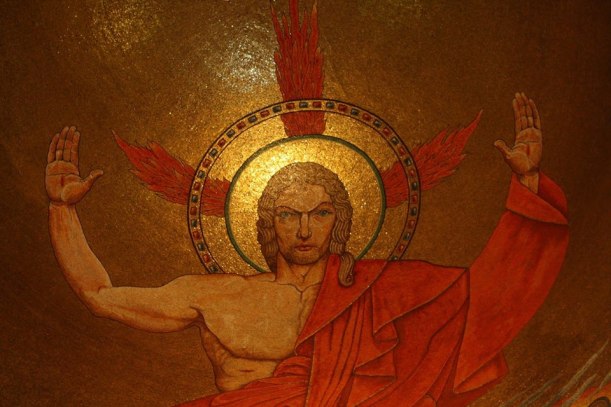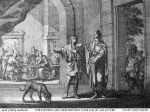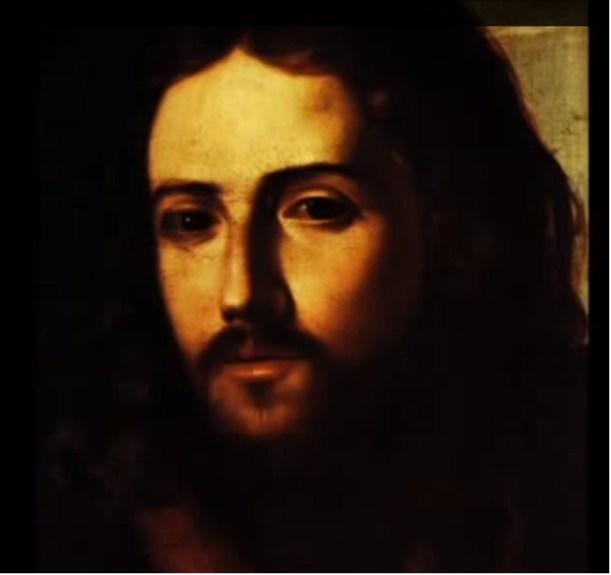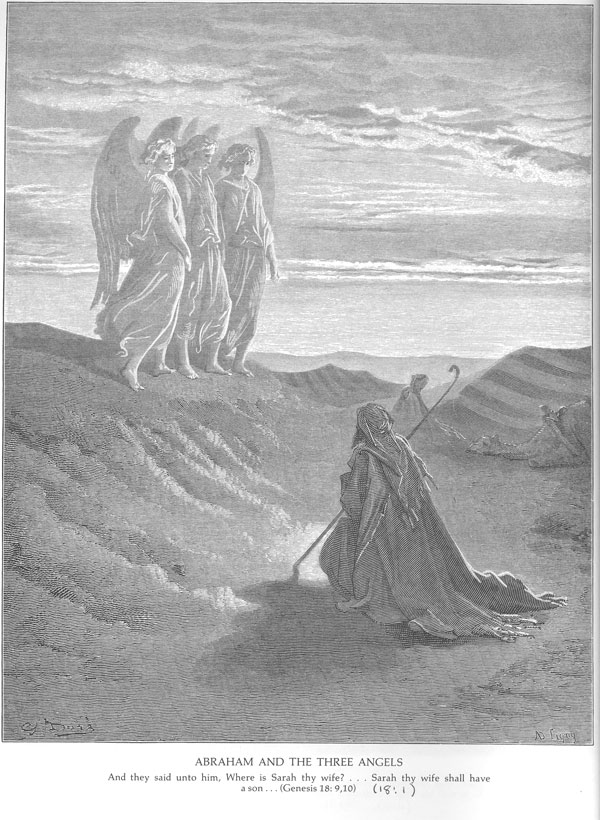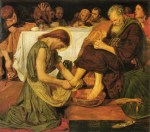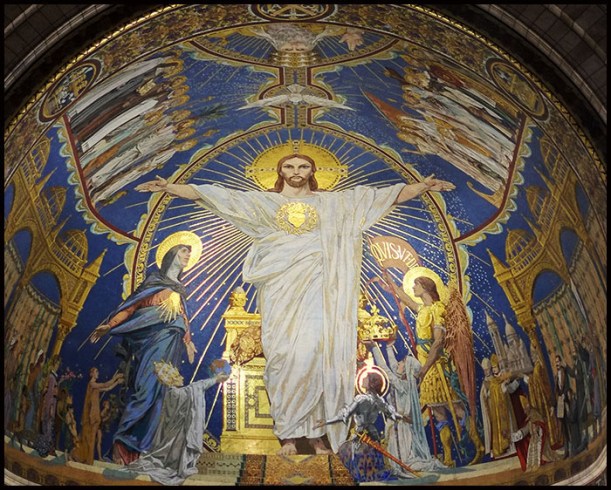It’s such an encouragement to the faithful when we see young men willing to step up and give themselves to the priesthood. Last night I had the joy of attending the ordination to the diaconate of four young men from the Perth Archdiocese. Many of you will know Mariusz Grzech who has been serving at our ‘parent’ parish of St Andrew’s, Clarkson, for the past year (if you didn’t know, Yanchep was part of St Andrew’s parish from 1994 until about 2001). Ordained with him were Konrad Gagatek, Joseph Laundy and Tung Vu, whom you can read more about here. I thought that I’d share with you some photos from the Ordination Mass …
This first photo shows the Promise of the Elect, where the Deacons make various promises about their new role (discharging the office of Deacon with ‘humble charity’, proclaiming the faith in word and deed, remaining celibate, deepening their prayer lives – especially by praying the Liturgy of the Hours – and conforming their lives to the example of Christ).
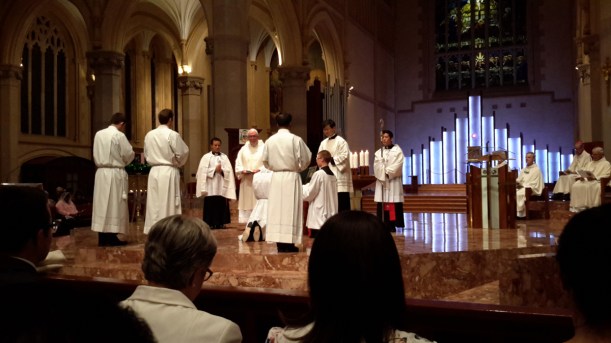
Promise of the Elect
The Deacons lie prostrate to receive the Lord’s blessing while our prayers fly to heaven in the soaring, otherworldly Litany of Supplication. (You can view this on the Record’s FB page.)
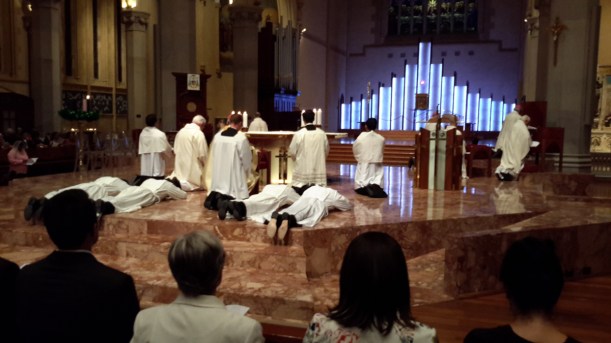
The Litany of Supplication
Next comes the Prayer of Ordination and the Laying on of Hands, where we bring to mind those first seven Deacons, appointed in similar fashion in Acts 6:1-7. This prayer has some beautiful words …
Send forth upon them, Lord, we pray,
the Holy Spirit,
that they may be strengthened
by the gift of your sevenfold grace …
May there abound in them every Gospel virtue
unfeigned love,
concern for the sick and poor,
unassuming authority,
the purity of innocence
and the observance of spiritual discipline.
(Excuse the blurriness of this photo, but my hands are not as steady as they used to be, I didn’t want to use a camera because of the shutter noise, and tablets are notoriously wobbly for still shots!)

The laying on of hands and the Prayer of Ordination
The Deacons are vested by their nominated priests, assisted by their families, with the Diaconal Stole and Dalmatic. Here Mariusz is helped by Fr Conor Steadman and his brothers. If you’re interested in the history of church vestments there is quite a nice article here, with illustrations, which calls the Dalmatic a garment with ‘festive origins’.
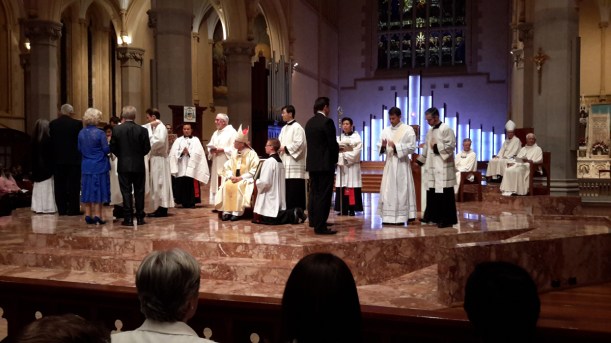
Investiture of the Diaconal Stole and Dalmatic
The Deacons receive the Book of the Gospels from Archbishop Costelloe.
Receive the Gospel of Christ,
whose herald you have become.
Believe what you read,
Teach what you believe,
and practice what you teach.
… says it all, really.

Handing on of the Book of the Gospels
Here the Archbishop makes his final address, where he conveys the Deacons’ messages of thanks to their families and all who have helped them get to this point.
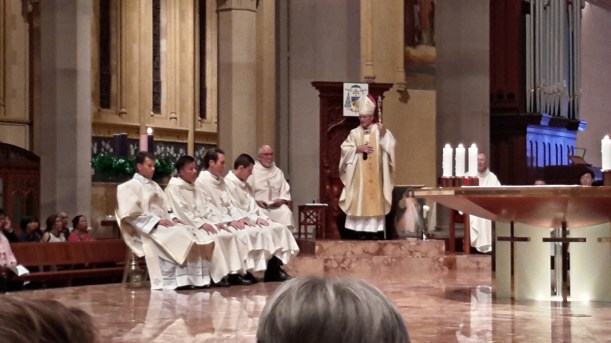
Final address from Archbishop Timothy Costelloe to the new Deacons, from left Mariusz Grzech, Tung Vu, Joseph Laundy and Konrad Gagatek.
This morning, it being the first Saturday of the month, I made the trip down to Clarkson and was pleased to be able to hear Mariusz’s first homily – which as a Deacon, he is now able to deliver. Appropriately enough, the Gospel was about asking the Lord of the harvest ‘to send labourers to the harvest’ (funny how God does that!) It also happened to be the memorial of St Francis Xavier, the most effective evangelist in history. So Mariusz’s homily was about St Francis Xavier, and also about our own role in mission – we don’t have to go overseas to go on mission – our mission field is Australia, our mission field is Perth, our mission field is our own Parish, our mission field is our family.
I must say I was pleased to hear it, as this blog is part of what I see as my mission … to whoever might read it. For example, what I write here is shared to my profiles on various social media platforms, one of them being LinkedIn. Now LinkedIn connects me with all my contacts in my capacity as Company Director. And LinkedIn is telling me that 30 of my business associates read my entry for last week, the First Sunday of Advent (and that’s not including FB or other platforms). I find this quite extraordinary – I have no idea who they are, but those people are quietly discovering the way prayer makes a difference in my life – and the Holy Spirit is waiting to invade, with his powerful presence, the lives of any of them who might be open to Him. Only this week, I discovered an extraordinary coincidence between a prayer uttered fourteen years ago, and the results now bearing fruit (but I will have to save that story for another time.) It’s a shame that many people are afraid to talk about their faith today (because we receive so much ridicule from secularists), but if we don’t toughen up and become unafraid to admit to following Christ, how will other people hear the kerygma – the message of the Gospel and the gift of eternal life?
Almost forgot … here is the Mass leaflet for today.
Today’s readings
Word format:year-a-advent-2nd-sunday-2016
Pdf format: year-a-advent-2nd-sunday-2016



